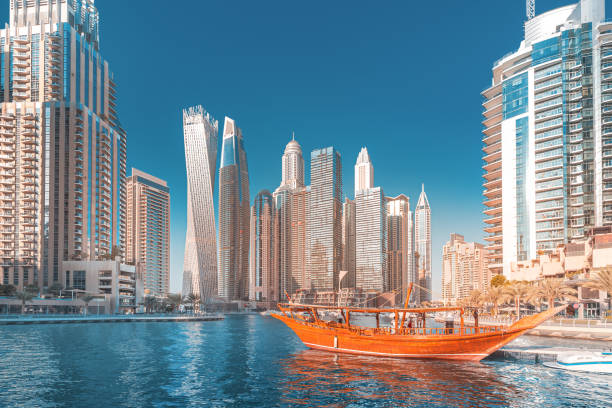Obtaining a Dubai residence visa is a crucial step for expatriates who wish to live and work in this vibrant city. This guide will walk you through the process, explaining the different types of residence visas available, the requirements for obtaining one, and the necessary steps to successfully complete your application. Whether you’re moving for employment, investment, or family reasons, understanding how to navigate the visa application process is essential.
Introduction to the Dubai Residence Visa

A residence visa in Dubai grants expatriates the legal status to live, work, and enjoy various benefits within the UAE. It is particularly important because it enables you to access services like healthcare, schooling for your children, and the ability to open a bank account. The UAE has established itself as a global business hub, attracting millions of people worldwide. To ensure a smooth transition to life in Dubai, it’s crucial to understand the residence visa framework, which is guided by federal regulations and policies. Furthermore, staying compliant with these regulations is key to avoiding legal complications or pitfalls. This guide aims to provide you with an organized pathway to acquiring your residence visa without unnecessary stress.
Understanding the Types of Residence Visas in Dubai

Dubai offers several types of residence visas tailored to meet the needs of different expatriates. Each category has distinct eligibility criteria and benefits, making it essential to choose the right one that aligns with your personal circumstances. The main types of residence visas include:
- Expats Residence Visa
- Investor and Entrepreneur Visa
- Employment-Based Residence Visa
Expats Residence Visa
The Expats Residence Visa is primarily targeted at those who are relocating to Dubai for work or long-term residence. Generally, this visa is issued to foreigners with a valid employment contract from a UAE-based company or those who have established their own business in Dubai. The duration of this visa varies depending on the employment terms and can be renewed upon meeting the renewal requirements. One significant advantage of this visa is that it allows holders to sponsor family members for residence visas, subject to specific income conditions. This category not only strengthens the workforce in Dubai but also creates a vibrant multicultural community. It’s important to note that the recently introduced Golden Visa and long-term residency programs have also expanded opportunities for expatriates intending to settle in the UAE.
Investor and Entrepreneur Visa
The Investor and Entrepreneur Visa is designed for individuals looking to invest in businesses or start their ventures in Dubai. This visa has gained popularity due to its appealing benefits, including the possibility of a long-term residency of up to ten years. To qualify for this visa, you need to meet specific criteria, such as investing a minimum amount in a UAE-based business or owning a property worth a certain value. Aside from offering residency, this visa provides access to a thriving market where investors can benefit from a dynamic economy. Additionally, successful applicants under this visa category can also apply for family residency, enhancing the overall appeal for entrepreneurs and their families who wish to establish their roots in Dubai.
Employment-Based Residence Visa
Employment-Based Residence Visas are one of the most sought-after categories and are granted to foreign workers hired by companies operating within the UAE. The process begins with an employer obtaining a work permit on behalf of the employee, followed by the residence visa application. A vital point to note is that the employment contract must be valid for at least two years for the visa to be issued. Applicants will also need to secure health insurance, undergo a medical examination, and provide proof of educational qualifications that meet UAE requirements. This visa not only allows expatriates to work legally but also serves as a pathway toward eventual citizenship for those who meet specific criteria. Therefore, having an employment-based residence visa opens doors to various professional opportunities and personal benefits within the UAE.
Requirements for Obtaining a Residence Visa

When applying for a Dubai residence visa, specific documentation and requirements must be fulfilled. Failing to provide the necessary documents can lead to delays or even denials in the application process. Here are the essential steps and documents generally required to obtain a residence visa:
- Valid passport with a minimum of six months validity.
- Passport-sized photographs meeting the UAE visa photo requirements.
- Employment contract or company sponsor letter.
- Proof of medical insurance coverage.
- Medical fitness certificate obtained from an approved health center.
- Additional documents may include marriage certificates or proof of kinship for family members.
Essential Documentation
Beyond the basic documents, applicants need to prepare additional paperwork relevant to their specific circumstances. For instance, if you’re applying under the Expats Residence Visa, evidence of your employment or business ownership may be required. Investor visa applicants need to submit proof of their financial investment, while family sponsorship requires documentation that verifies the relationship and beneficiary’s dependents. Engaging a reliable immigration consultant can be of great help in ensuring that no necessary documentation is overlooked. As the UAE’s regulatory requirements can change, staying updated on the latest documentation requirements is critical. Ultimately, preparing a comprehensive set of documents enhances your chances of a smooth visa application process.
Medical Testing and Health Insurance
Medical testing is a mandatory requirement for obtaining a Dubai residence visa. All applicants must undergo a health check-up at government-approved medical facilities, which typically includes a blood test and a chest X-ray to screen for infectious diseases such as tuberculosis. Depending on the results, applicants may need to provide further medical records. In addition to the medical examination, obtaining health insurance is crucial in safeguarding your health while residing in Dubai. The insurance must meet specific coverage requirements set by the UAE government, ensuring that expatriates have access to essential medical services. This health insurance policy will not only help facilitate the visa application but will also provide peace of mind as you navigate life in a new country.
Application Process for the Residence Visa
The application process for securing a Dubai residence visa can be conducted through various channels, including online portals or in-person applications at designated government offices. The online application is often regarded as the most convenient method, allowing applicants to submit documents, track progress, and receive notifications regarding their visa status. To begin, you will need to create an account on the official UAE immigration website and fill out the necessary forms. Once you have submitted your application, you can expect a review period that varies in length depending on the complexity of your visa type and the accuracy of submitted documents. On the other hand, if you choose to apply in person, you may be required to visit different government agencies for submitting paperwork, which could be more time-consuming. Regardless of the method chosen, being prepared and organized is essential for a successful application.
Important Fees and Costs Associated with the Visa
Applying for a Dubai residence visa entails several fees and associated costs that applicants should be prepared for. The total expenses can include application fees, medical examination costs, health insurance premiums, and various government charges. Understanding these costs upfront can help you budget more effectively. For example, the application fee can vary significantly depending on the type of visa, generally ranging from AED 1,000 to AED 3,000. Additionally, medical examination fees may add an extra AED 300 to AED 700, depending on the tests required and the medical facility you choose. Health insurance is another pivotal expense, where annual premiums can range anywhere from AED 500 to AED 2,500, depending on the coverage level and provider. Here’s a helpful breakdown of anticipated expenses when applying for a Dubai residence visa:
| Type of Expense | Estimated Cost (AED) |
|---|---|
| Application Fee | 1,000 – 3,000 |
| Medical Examination | 300 – 700 |
| Health Insurance | 500 – 2,500 |
| Other Costs | Variable |
Furthermore, once you obtain your residence visa, be mindful of renewal costs that will come into play, as these can also vary considerably. Regular monitoring of your visa’s expiration date is essential to avoid ground fees or penalties due to delays in the renewal. Many new residents may overlook the additional costs for family visas or when including dependents, which may compound your overall expenses. As such, having a comprehensive understanding of your financial obligations will provide you with a clearer picture as you transition to living in Dubai. Additionally, budgeting for unforeseen expenses is advisable, as there may be additional requirements or fees imposed by your employer or governmental institutions.
Concluision
Acquiring a Dubai residence visa can seem complex, but understanding the different categories, requirements, and associated costs makes it manageable. Throughout this guide, we explored essential aspects of the residence visa, including types suited for expatriates, necessary documentation, the application process, and the financial implications involved. Each type of visa serves a distinct purpose, allowing expatriates to establish their lives in Dubai for varied reasons, like work, investment, or family reunification. Being well-prepared can not only streamline your application but also improve your overall experience as you navigate life in a dynamic city like Dubai. Ultimately, gathering the right documents, understanding costs, and familiarizing yourself with the health requirements ensures you are set for a successful application journey.
Frequantly Asked Questions
1. How long does it take to get a residence visa in Dubai?
The processing time for a residence visa in Dubai generally takes between 2 to 4 weeks from the moment your application is submitted, depending on the type of visa and the thoroughness of your documentation.
2. Can I sponsor my family for a Dubai residence visa?
Yes, you can sponsor your immediate family members on a residence visa, such as your spouse and children, provided you meet the minimum salary requirements set by the UAE’s immigration authorities.
3. Is it possible to work on a residence visa tied to my spouse’s employment?
Yes, if you have a residence visa that is sponsored by your spouse’s employer, you can also apply for a work permit and work legally in Dubai under specific guidelines provided by the UAE Ministry of Human Resources and Emiratisation.
4. Do I need to undergo a medical test for a residence visa in Dubai?
Yes, all applicants are required to undergo a medical examination to screen for communicable diseases, and they must submit a medical fitness certificate from an approved healthcare provider as part of the application process.
5. What should I do if my residence visa is about to expire?
To prevent any legal issues, you should initiate the renewal process at least 30 days before your visa’s expiration date. This allows sufficient time for document processing and helps avoid potential penalties or complications with your residency status.